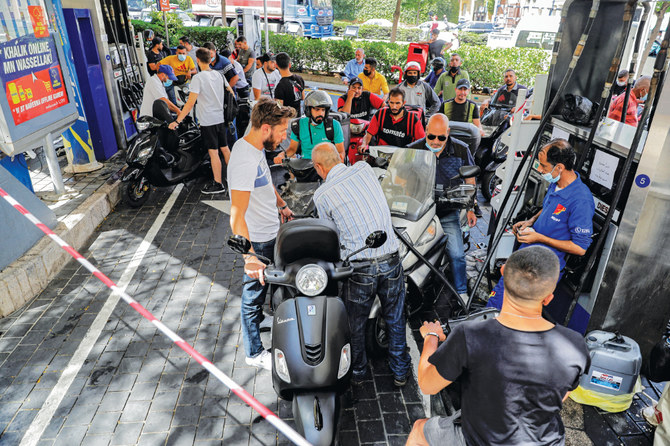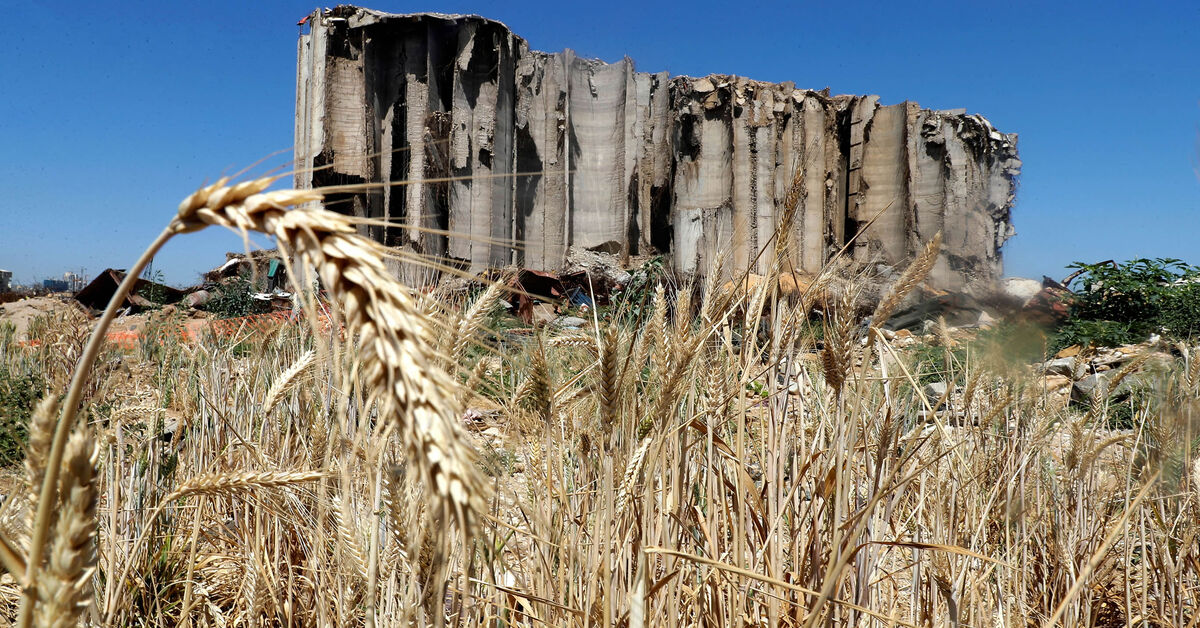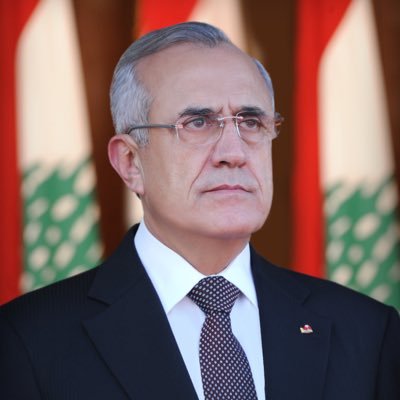
by arabnews.com -- Najia Houssari -- BEIRUT: Supermarket owners in Lebanon have blamed “hard-line measures” from the Banque du Liban for the introduction of a new payment system for their customers. The central bank’s change requires the payment of 50 percent of the value of purchases in cash, and 50 percent through bank cards, on account of “low liquidity” in markets, according to Nabil Fahed, head of the Syndicate of Supermarket Owners. This development came the same day as gas station owners decided to stop accepting full payments for fuel via bank card. Dr. Jassem Ajaka, an economist, described the repercussions as “economically catastrophic, as long as the amount of banknotes in Lebanese pounds that a citizen can withdraw from banks is limited while prices are rising.” This situation, he claimed, would make people consume less, causing a decline in GDP and a larger contraction in the economy.
Charles Arbid, president of the Economic and Social Council, said that Lebanon “is experiencing inflationary depression: That is, consumption and economic movement are stalled.” Operational prices are also rising for sectors such as energy and transportation, developments which, he said, require the immediate launch of a three-dimensional participatory dialogue at government level with employers and workers to devise solutions and take action. He added: “No solutions are magical and readily available.” The Association of Banks in Lebanon, meanwhile, will pay the government-approved social assistance to public sector employees, including the military. This assistance is equivalent to half of an additional salary per month, with a minimum of 1.5 million Lebanese pounds ($993) and a maximum of 3 million pounds. Sixty percent of this is paid in cash, and other means of payment are being adopted to transfer the remaining 40 percent by bank card or check.

By MICHAEL TANCHUM -- thenationalnews.com -- As Russia's two-week-old war against Ukraine has brought Lebanon's wheat imports from the besieged Black Sea nation to a complete standstill, the government in Beirut is racing against the clock to avert a catastrophic food crisis. The conflict has set off a food security problem for many nations across the Middle East and North Africa – a region that relies on the Black Sea wheat-growing region as their bread basket – but Lebanon's situation is uniquely precarious. Its severe lack of storage capacity combined with its economic state of hyperinflation is to blame. The situation is dire, and in the absence of immediate financial assistance, a food system collapse could happen in a matter of weeks or even days.
Lebanon needs to import about 50,000 metric tonnes of wheat each month to cover the nation's demand for bread, and the government had relied on Ukraine to provide about two thirds of that wheat supply, amounting to more than 400,000 metric tonnes per year. Lebanon used to be able to store four months' worth of wheat reserves, but the August 2020 Beirut Port explosion destroyed the country's primary grain storage silos, removing 120,000 tonnes of storage capacity that has yet to be restored to this day. Lebanon's other major port in Tripoli has no grain storage capacity, leaving the country to fend with only a one month's storage by using warehouses owned by 12 mills.
by reuters — BEIRUT: A Lebanese prosecutor on Thursday issued travel bans against the heads of the boards of five Lebanese banks …

وطنية - عقد "لقاء الجمهورية" اجتماعه عبر تطبيق" زوم" برئاسة الرئيس ميشال سليمان واكد في بيان "ضرورة إجراء الانتخابات في مواعيدها، لانه عدا عن كونها حقا طبيعيا للمواطن وأحد الأعمدة الأساسية للنظام الديموقراطي، فإنها تشكل سدا بوجه تسلط الحكام والامعان في المحاصصة، لذا فلا يجوز وتحت أي غطاء أو عذر تأجيل مواعيد استحقاقها"، مشيرا الى ان" طرح تنفيذ الميغاسنتر على أهميته وضرورته في هذا التوقيت طرح ملتبس"، معربا عن خشيته من "ان ينسف مواعيد الاستحقاقات الدستورية".
ورأى "في الحرب على اوكرانيا خروجا عن المألوف والمنتظر من الدول الكبرى"، واعتبر ان "حرية الدول تجسيد لحرية الفرد ويرفض اللجوء إلى القوة لتغيير نظام ما، أو فرض شروط معينة، وتشكل انتهاكا لحقوق الانسان ومواثيق الأمم المتحدة الملزمة للبنان وفق الفقرة "ب" من مقدمة الدستور وهذا الموقف لا يخرج اطلاقا عن سياسة الحياد"، مؤكدا ان "الحوار هو الطريق الامثل لحل
Khazen History


Historical Feature:
Churches and Monasteries of the Khazen family

St. Anthony of Padua Church in Ballouneh
Mar Abda Church in Bakaatit Kanaan
Saint Michael Church in Bkaatouta
Saint Therese Church in Qolayaat
Saint Simeon Stylites (مار سمعان العامودي) Church In Ajaltoun
Virgin Mary Church (سيدة المعونات) in Sheilé
Assumption of Mary Church in Ballouneh
1 - The sword of the Maronite Prince
2 - LES KHAZEN CONSULS DE FRANCE
3 - LES MARONITES & LES KHAZEN
4 - LES MAAN & LES KHAZEN
5 - ORIGINE DE LA FAMILLE
Population Movements to Keserwan - The Khazens and The Maans
ما جاء عن الثورة في المقاطعة الكسروانية
ثورة أهالي كسروان على المشايخ الخوازنة وأسبابها
Origins of the "Prince of Maronite" Title
Growing diversity: the Khazin sheiks and the clergy in the first decades of the 18th century
Historical Members:
Barbar Beik El Khazen [English]
Patriach Toubia Kaiss El Khazen(Biography & Life Part1 Part2) (Arabic)
Patriach Youssef Dargham El Khazen (Cont'd)
Cheikh Bishara Jafal El Khazen
Patriarch Youssef Raji El Khazen
The Martyrs Cheikh Philippe & Cheikh Farid El Khazen
Cheikh Nawfal El Khazen (Consul De France)
Cheikh Hossun El Khazen (Consul De France)
Cheikh Abou-Nawfal El Khazen (Consul De France)
Cheikh Francis Abee Nader & his son Yousef
Cheikh Abou-Kanso El Khazen (Consul De France)
Cheikh Abou Nader El Khazen
Cheikh Chafic El Khazen
Cheikh Keserwan El Khazen
Cheikh Serhal El Khazen [English]
Cheikh Rafiq El Khazen [English]
Cheikh Hanna El Khazen
Cheikha Arzi El Khazen
Marie El Khazen